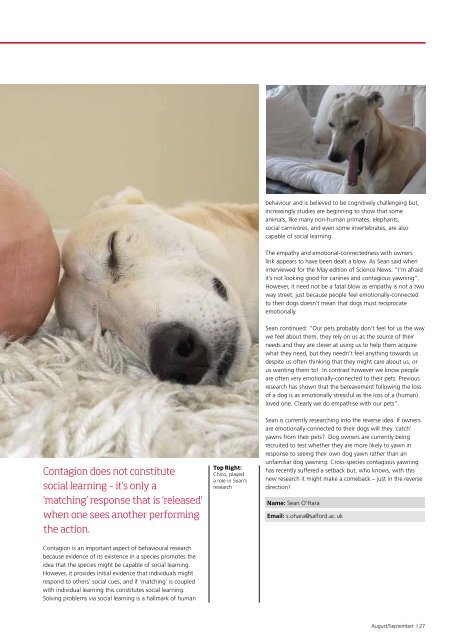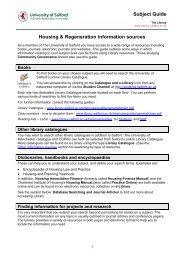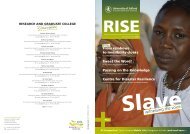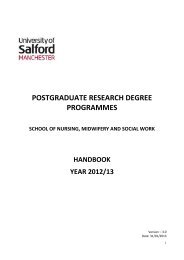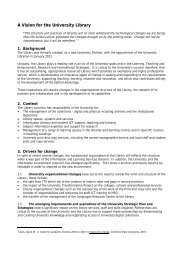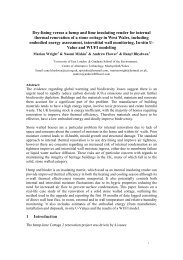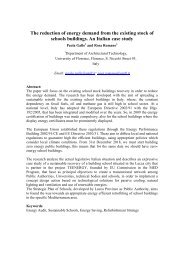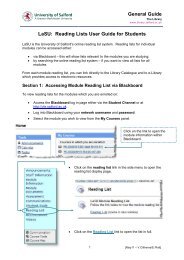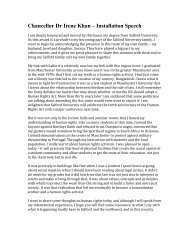RISE August-September 2011 - University of Salford
RISE August-September 2011 - University of Salford
RISE August-September 2011 - University of Salford
Create successful ePaper yourself
Turn your PDF publications into a flip-book with our unique Google optimized e-Paper software.
ehaviour and is believed to be cognitively challenging but,<br />
increasingly studies are beginning to show that some<br />
animals, like many non-human primates, elephants,<br />
social carnivores, and even some invertebrates, are also<br />
capable <strong>of</strong> social learning.<br />
The empathy and emotional-connectedness with owners<br />
link appears to have been dealt a blow. As Sean said when<br />
interviewed for the May edition <strong>of</strong> Science News: “I’m afraid<br />
it’s not looking good for canines and contagious yawning”.<br />
However, it need not be a fatal blow as empathy is not a two<br />
way street; just because people feel emotionally-connected<br />
to their dogs doesn’t mean that dogs must reciprocate<br />
emotionally.<br />
Sean continued: “Our pets probably don’t feel for us the way<br />
we feel about them, they rely on us as the source <strong>of</strong> their<br />
needs and they are clever at using us to help them acquire<br />
what they need, but they needn’t feel anything towards us<br />
despite us <strong>of</strong>ten thinking that they might care about us, or<br />
us wanting them to! In contrast however we know people<br />
are <strong>of</strong>ten very emotionally-connected to their pets. Previous<br />
research has shown that the bereavement following the loss<br />
<strong>of</strong> a dog is as emotionally stressful as the loss <strong>of</strong> a (human)<br />
loved one. Clearly we do empathise with our pets”.<br />
Contagion does not constitute<br />
social learning – it’s only a<br />
‘matching’ response that is ‘released’<br />
when one sees another performing<br />
the action.<br />
Top Right:<br />
Chico, played<br />
a role in Sean’s<br />
research<br />
Sean is currently researching into the reverse idea. If owners<br />
are emotionally-connected to their dogs will they ‘catch’<br />
yawns from their pets? Dog owners are currently being<br />
recruited to test whether they are more likely to yawn in<br />
response to seeing their own dog yawn rather than an<br />
unfamiliar dog yawning. Cross-species contagious yawning<br />
has recently suffered a setback but, who knows, with this<br />
new research it might make a comeback – just in the reverse<br />
direction!<br />
Name: Sean O’Hara<br />
Email: s.ohara@salford.ac.uk<br />
Contagion is an important aspect <strong>of</strong> behavioural research<br />
because evidence <strong>of</strong> its existence in a species promotes the<br />
idea that the species might be capable <strong>of</strong> social learning.<br />
However, it provides initial evidence that individuals might<br />
respond to others’ social cues, and if ‘matching’ is coupled<br />
with individual learning this constitutes social learning.<br />
Solving problems via social learning is a hallmark <strong>of</strong> human<br />
<strong>August</strong>/<strong>September</strong> | 27


